A Quote by Tim Crouch
Children and teenagers don't easily relate to stories about kings and dukes, and to tell only stories about kings and dukes is to ignore the regular people.
Related Quotes
It didn't take me long to make up my mind that these liars warn't no kings nor dukes at all, but just low-down humbugs and frauds. But I never said nothing, never let on; kept it to myself; it's the best way; then you don't have no quarrels, and don't get into no trouble. If they wanted us to call them kings and dukes, I hadn't no objections, 'long as it would keep peace in the family; and it warn't no use to tell Jim, so I didn't tell him. If I never learnt nothing else out of pap, I learnt that the best way to get along with his kind of people is to let them have their own way.
Each of us is comprised of stories, stories not only about ourselves but stories about ancestors we never knew and people we've never met. We have stories we love to tell and stories we have never told anyone. The extent to which others know us is determined by the stories we choose to share. We extend a deep trust to someone when we say, "I'm going to tell you something I've never told anyone." Sharing stories creates trust because through stories we come to a recognition of how much we have in common.
They were offered the choice between becoming kings or the couriers of kings. The way children would, they all wanted to be couriers. Therefore there are only couriers who hurry about the world, shouting to each other - since there are no kings - messages that have become meaningless. They would like to put an end to this miserable life of theirs but they dare not because of their oaths of service.
AS SOMBRAS DA ALMA. THE SHADOWS OF THE SOUL. The stories others tell about you and the stories you tell about yourself: which come closer to the truth? Is it so clear that they are your own? Is one an authority on oneself? But that isn't the question that concerns me. The real question is: In such stories, is there really a difference between true and false? In stories about the outside, surely. But when we set out to understand someone on the inside? Is that a trip that ever comes to an end? Is the soul a place of facts? Or are the alleged facts only the deceptive shadows of our stories?
We can tell people abstract rules of thumb which we have derived from prior experiences, but it is very difficult for other people to learn from these. We have difficulty remembering such abstractions, but we can more easily remember a good story. Stories give life to past experience. Stories make the events in memory memorable to others and to ourselves. This is one of the reasons why people like to tell stories.






































